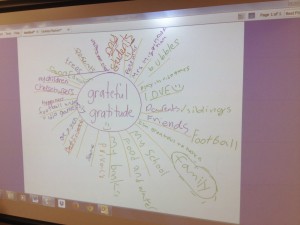With Thanksgiving just around the corner, there will inevitably be a lot of talk about thankfulness and appreciation of life and all they have to offer. Aside from the goodness of gratitude on a personal, social, and at times economic level, rarely do we talk about the healing power of #gratitude. This Thanksgiving and each day forward, let’s focus on thankfulness and gratitude as a tool we can use to help each of us feel better from the inside out.
Living in a world where individuals across cultures are mired with stress from every direction, the very idea of existing with a sound mind and body is fast becoming a distant dream for many. In fact, an estimated 90 percent of all doctor visits are for stress-related aliments and today’s biggest health challenges are cardiovascular disease, mental disorders, cancer, diabetes, and obesity — all conditions that are often linked to living in a state of constant stress (Yakel, 2014).
However, evidence now shows that if we lived each day as though it were Thanksgiving, then, the major causes of stress and imbalance in life would not be allowed to spiral out of our control. Actually, the idea of ‘practicing gratitude’ is gaining traction in the world as an effective means to tackle stress and its negative effects like #depression, #anxiety and others. “Changing worry to gratitude dramatically affects the way our body responds to stress,”Yakel discusses, drawing on a recent research finding.
To further quote Yakel’s article, The Healing Power of Gratitude, he states,“Robert Emmons, Ph.D., and professor at the University of California, Davis, has written the first major scientific study on gratitude, its causes, and potential impact on human health. In his work entitled Thanks! How the New Science of Gratitude Can Make You Happier, Dr. Emmons concluded that ‘grateful people experience higher levels of positive emotions such as joy, enthusiasm, love, happiness, and optimism, and the practice of gratitude as a discipline protects a person from the destructive impulses of envy, resentment, greed, and bitterness’.”

Students list what they are grateful for on classroom whiteboard as part of Schools for Hope curriculum.
Undoubtedly, an ability to morph worry and despair into gratitude will breed #hope as well. Many articles which hone in on the power of gratitude in healing, inform us that focusing on what one has, as opposed to what one doesn’t have, is the key to gratitude. This may indeed also be the key to planting seeds of hope; in essence, it requires one to be able to place focus on the positive over the negative. One of the tools we teach in our Schools for Hope program is the importance of gratitude and how it aids in our mental health. Here are some helpful suggestions and ways a person may develop and express gratitude.
- Writing in a gratitude journal
- Thanking at least one person a day
- Spending one minute a day thinking about and/or listing all of the things in life for which you are thankful.
Of course, each person will have their own way of understanding and practicing gratitude, but it is central to remember that it does have the power to heal and if we can be grateful, then we’re likely to be happier, which means we will naturally be healthier as well. As such, the relevance of gratitude then in cases of #depression and #anxiety also cannot be overlooked. The way in which to addresses these illnesses too is rooted in the perpetuation of a sense of positive energy and #hopefulness. So this Thanksgiving, let’s not just #givethanks, but accept and internalize the healing power of gratitude!



Speak Your Mind